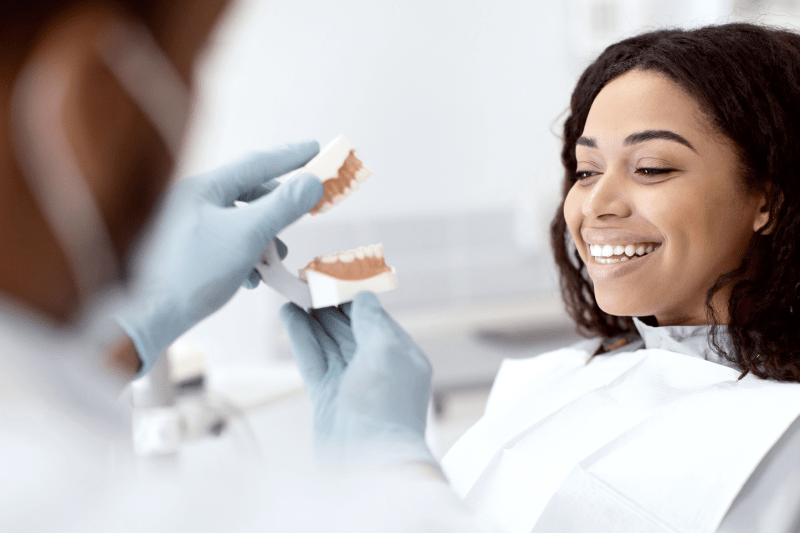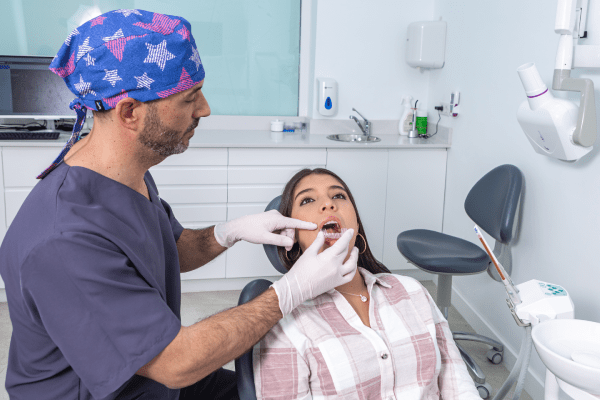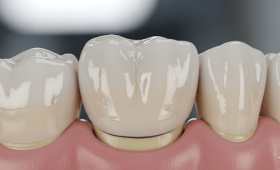What Is a Dental Crown and Why Is It Needed?
A dental crown is an artificial cap placed over a weakened, broken, or decayed tooth to protect and strengthen it. They are usually made of porcelain, zirconia, or metal, and restore both the functional integrity and the aesthetic appearance of the tooth.
The most common reasons for needing a crown include: when a tooth cannot provide enough support for a large filling, a tooth becoming brittle after root canal treatment, repairing worn-down teeth, or permanently improving the shape and color of a tooth. A crown extends the life of the tooth and helps protect it by evenly distributing chewing pressure.
What Are the Advantages of Getting a Dental Crown?
Getting a dental crown has many important advantages. First, it protects a fragile or damaged tooth, preventing further cracking or breaking. This ensures the tooth remains healthy in the long term. Second, it restores chewing function and strength, which increases comfort while eating. Third, crowns mimic the natural color, shape, and size of the tooth, allowing you to achieve an aesthetic smile. Crowns made with materials like zirconia and full porcelain offer the most natural appearance. Additionally, crowns strengthen the overall structure of the tooth and prevent neighboring teeth from shifting.
What Are the Disadvantages of a Dental Crown?
Some disadvantages of dental crowns should also be considered. One of the most prominent disadvantages is that a portion of the healthy tooth structure must be removed to place the crown. This is an irreversible procedure. Second, although crowns are durable, they can sometimes loosen, crack, or fall off over time. Third, slight sensitivity may occur after the crown is placed, but this is usually temporary. Finally, dental crown treatment can be more costly than other dental procedures like fillings or onlays, and all expenses may not be covered by insurance.
Are Dental Crowns Long-Lasting?
With proper care and good oral hygiene, dental crowns can last 10 to 15 years or longer. The lifespan of a crown depends on the quality of the material used, the craftsmanship of the crown, and the individual’s oral hygiene habits. Habits like biting on hard foods, teeth grinding, or nail-biting can shorten the crown’s lifespan. Regular dental check-ups are crucial for monitoring the crown’s condition and detecting any potential issues early.
Is Dental Crown Treatment Painful?
Dental crown treatment is generally a painless procedure as it is performed under local anesthesia. Thanks to the anesthesia, you will not feel any pain or discomfort during the preparation of the tooth and the placement of the crown. Slight sensitivity or pain may occur after the procedure, but this usually subsides on its own within a few days. If needed, simple pain relievers recommended by your dentist can help alleviate this sensitivity. If the pain persists or worsens, it is important to contact your dentist.
What Is the Dental Crown Procedure Like?
The dental crown procedure is usually completed in two appointments. In the first appointment, the dentist examines your tooth and performs the necessary preparations. Local anesthesia is applied to prevent sensitivity around the tooth. Then, the tooth’s surface is reduced slightly to make room for the crown. During this stage, an impression of the tooth is taken and sent to a lab. In the second appointment, the permanent crown prepared in the lab is cemented onto the tooth, and final checks are performed. A temporary crown is used in between these two stages.
What Materials Are Dental Crowns Made Of?
Dental crowns are made from various materials to meet different aesthetic and durability needs. Porcelain-fused-to-metal crowns are strong and affordable but may have some aesthetic drawbacks. Full porcelain crowns offer the most natural appearance and are ideal for front teeth, but their durability is limited. Zirconia crowns, on the other hand, have superior properties in both durability and aesthetics, and since they do not contain metal, they are biocompatible.
What Are the Risks of Dental Crown Treatment?
Dental crown treatment is generally a safe procedure, but it carries some risks. Cold and hot sensitivity may occur in the teeth after the crown is placed. If the crown does not fit correctly, it can lead to gum inflammation or decay underneath. In rare cases, the tooth’s nerve may be damaged during the crowning process, and root canal treatment may be required. These risks can be minimized by using an experienced dentist and modern technology.
Do Dental Crowns Damage Other Teeth?
When done correctly, a dental crown does not damage other teeth. On the contrary, it helps prevent the wear or shifting of neighboring teeth by evenly distributing chewing pressure. However, if the crown is too high or improperly placed, it can cause wear on the opposing tooth during chewing. Therefore, regular dental check-ups are important to ensure the crown fits correctly.
What Factors Affect the Price of a Dental Crown?
The price of a dental crown varies depending on the type of material used, the number of teeth to be treated, the dentist’s experience, and the geographical location of the clinic. Zirconia and full porcelain crowns are more expensive. Additional procedures (root canal treatment, filling) needed before the treatment can also increase the cost. For transparent pricing, a personalized treatment plan should be created after a detailed examination.
Do Dental Crowns Affect Gum Health?
A properly made dental crown does not negatively affect gum health. The edges of the crown should seamlessly blend with the gum line, leaving no gaps. If the crown presses against the gum or there is a gap between them, it can lead to gum inflammation and infections. Therefore, it is important to ensure that the crown fits perfectly with the gum.
How Can a Dental Crown Be Distinguished from Other Teeth?
Modern dental crowns, especially when made using materials like full porcelain and zirconia, are very difficult to distinguish from natural teeth. These materials reflect light like natural teeth and offer a wide range of colors. The dentist carefully selects the crown’s color, shape, and size to match your other teeth. This ensures an aesthetic harmony, making the crown difficult to notice.
How Can the Lifespan of a Dental Crown Be Extended?
The most important factors to extend the lifespan of a dental crown are good oral hygiene and regular dental check-ups. Brushing at least twice a day and flossing keep the area around the crown and gum clean. Avoiding very hard or sticky foods prevents the crown from cracking. If you grind your teeth at night, using a protective night guard can also extend the crown’s lifespan.
How Long Does the Dental Crown Procedure Take?
The dental crown procedure is usually completed in two separate appointments. The first appointment for tooth preparation and taking impressions takes about an hour. These impressions are sent to a lab, and the production of the crown takes a few days. The second appointment is for cementing the permanent crown to the tooth and performing final checks, which also takes about an hour. This process can be longer depending on the number of teeth to be treated.
What Foods Should Be Avoided After Getting a Dental Crown?
After a dental crown is placed, it’s advisable to avoid very hot or cold foods and drinks, especially for the first few days, due to potential sensitivity. Hard and sticky foods should be consumed carefully as they can cause the crown to shift or crack. It’s important to avoid cracking hard-shelled foods like almonds or walnuts with your crowned tooth.
Is There a Risk of Infection in Dental Crown Treatment?
The risk of infection in dental crown treatment is very low when it is performed in a sterile environment and with correct techniques. However, if the crown does not fit the tooth perfectly, bacteria can leak from the edges and accumulate under the tooth or at the gum line, causing decay or infection. To prevent this, it is crucial to pay the utmost attention to oral hygiene after the treatment and to have regular check-ups.
What Is the Success Rate of Dental Crown Treatment?
The success rate of dental crown treatment is very high when it is correctly planned, with quality materials, and applied by an experienced dentist. Thanks to modern techniques and materials, crowns can be used without problems for many years. To increase the success rate, the patient must also establish a good oral hygiene routine and not skip regular check-ups.
Can a Dental Crown Be Removed?
A dental crown is a permanent dental solution and cannot be easily removed. If a problem occurs with the crown (crack, break, looseness), it is carefully removed by the dentist with special tools and a new one is made to replace it. The process of removing a crown requires great care and experience to avoid damaging the underlying tooth.
Why Are Dental Crown Prices More Affordable in Turkey?
The main reason why dental crown prices are more affordable in Turkey compared to Western countries is the lower general cost of living and operational costs. This leads to lower staff salaries and laboratory costs for clinics. Additionally, thanks to the exchange rate advantage, attractive prices can be offered to international patients. This economic advantage does not mean a compromise on quality.

What Preparations Should Be Made Before Getting a Dental Crown?
Before getting a dental crown, some preparations may be made to ensure the tooth is completely healthy. If there is decay in the tooth, it should first be cleaned and a filling should be placed. If the tooth’s nerves are damaged or inflamed, root canal treatment may be necessary. If there is gum inflammation, gum treatment should be applied first. These preparations ensure that the crown is long-lasting and healthy.
Is There an Age Limit for Getting a Dental Crown?
There is no specific age limit for getting a dental crown, but it is generally not preferred for children as their teeth and jaw development are still ongoing. For adults, whether they are a suitable candidate for a crown is determined by the overall health of their tooth and jaw structure. Having sufficient tooth structure and healthy gums are the most important criteria.
Should a Dental Crown Be Placed After Teeth Whitening?
Yes, if you are planning to get a dental crown, it is recommended to have teeth whitening done before the crown. This is because a crown is an artificial material and its color does not change. If you whiten your teeth after your crown is made, a color difference will occur between the crown and your natural teeth. Therefore, the color of your crown should be determined according to the desired level of whiteness.
What Should Be Done If a Dental Crown Falls Out?
If your dental crown comes loose or falls out, do not panic. Keep the crown in a clean place and contact your dentist as soon as possible. Your dentist can re-cement the crown or make a new one if it is damaged. During this time, your uncrowned tooth will be sensitive, so you should avoid very hot or cold foods and drinks.
What Is the Difference Between a Dental Crown and a Dental Bridge?
A dental crown (cap) is used to repair a single damaged tooth, while a dental bridge is a structure designed to replace one or more missing teeth. A crown is placed over an existing tooth, while a bridge is cemented to the abutment teeth on either side of the missing tooth space. These are two different treatment methods for two different problems.
Can Dental Crown Treatment Be Completed in a Single Appointment?
Thanks to modern CAD/CAM (Computer-Aided Design and Manufacturing) technology, in some cases, dental crown treatment can be completed in a single appointment. This technology allows the dentist to digitally take an impression of the tooth and produce the crown immediately in the clinic. However, for multiple teeth or more complex cases, several appointments may be needed for the best result.
Does a Dental Crown Affect Speech?
A dental crown generally does not negatively affect speech. On the contrary, it can help correct speech impediments caused by missing or damaged teeth. For the first few days, you may feel a slight strangeness as you get used to the new crown, but this sensation quickly passes.
Why Should I Choose Turkey for Dental Crown Treatment?
Turkey offers many advantages for dental crown treatment. Thanks to high-quality service, state-of-the-art equipment, experienced dentists, and more affordable prices compared to Western countries, you can both get treatment and have a vacation. You can easily plan this process by contacting Cure Holiday.
What Should Be Done If a Dental Crown Cracks or Breaks?
If you notice a crack or break in your dental crown, you should immediately contact your dentist. Small cracks can sometimes be repaired, but large cracks usually require the crown to be completely replaced with a new one. Continuing to use a cracked crown can damage the underlying tooth.
Can Teeth Under a Dental Crown Decay?
Yes, the teeth under a dental crown can decay if the crown does not fit perfectly or if oral hygiene is poor. Bacteria and food debris can leak from the edges of the crown and accumulate underneath the tooth, leading to decay. Therefore, it is very important that the crown is made perfectly and that regular care is performed.
Is There a Consultation Fee for a Dental Crown?
Most dental clinics offer the first consultation and examination for dental crown treatment free of charge. This is to determine if you are a suitable candidate for the treatment and to create a personalized plan for you. Health tourism companies like Cure Holiday also provide this service for free.
Is Pain Medication Needed During Dental Crown Treatment?
After dental crown treatment, over-the-counter pain relievers are usually sufficient to relieve sensitivity. If you feel severe pain, it may be a sign of a problem, and you should immediately consult your dentist.
Does the Color of a Dental Crown Change?
The color of a dental crown does not change over time like natural teeth. Therefore, if you are considering teeth whitening, you should do it before getting the crown. Otherwise, while your natural teeth whiten, your crown will remain in its old color, and a color difference will occur.
Am I a Suitable Candidate for Dental Crown Treatment?
Whether you are a suitable candidate for dental crown treatment is determined by a detailed examination by your dentist. In general, there must be sufficient healthy tooth structure in the tooth to be crowned and the gums must be healthy.
What Should I Do If I Have Other Questions About Dental Crowns?
For any questions you may have about dental crown treatment, you can contact the expert team at Cure Holiday. We are here to create a personalized treatment plan for you and to answer all your questions.



